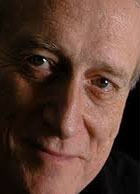George Quasha
George Quasha Poems
I was a man
and I was trying to save a woman in danger.
I picked her up in my arms
and flew.
...
I'm feeling by ear.
Consider them gods and not cruel but ecstatic.
They have trick tongues and can't talk straight but use us as waves to curve words.
In this moment we are here for their ride. Climb on under.
...
The trouble with paradise is you never want to be away from home.
I make what calls me out.
All gone before you know it.
...
George Quasha Biography
Poet, writer, musician, and artist George Quasha was born in White Plains, New York, and grew up in Florida. His many full collections of poetry include Amanita’s Hymnal (1970), Magic Spell for the Far Journey (1971), Somapoetics (1973), Word-Yum: Somapoetics 64-69 (1974), Giving the Lily Back Her Hands (1979), Ainu Dreams (with Chie Hasegawa, 1999), and preverbs, Verbal Paradise (2011). In his essay “notes toward a poetics of living,” Quasha notes the limitations of being wholly part of the art world or of the poetry world: “I apparently need both to be able to keep the space open in which the work I do happens. I’m not easily at home in either ‘world.’ So, I’m the kind of poet who engages in creating a world.” His art draws on multiple mediums to explore common principles within language, sculpture, sound, installation, and performance. Quasha’s most recent projects include “art is,” recordings of more than 800 artists, poets, and composers discussing their understanding of art. His sculptures, in which he uses stones and gravity, were documented and published in Axial Stones: An Art of Precarious Balance (2006). His work has been exhibited internationally in venues such as White Box, the Samuel Dorsky Museum, and multiple biennials. Quasha’s video installation/single-channel work art is (Speaking Portraits) asks over 1,000 artists, poets, and composers (from 11 countries and 21 languages) what in their view art is. This ongoing work (art is/music is/poetry is) has been exhibited at the Snite Museum of Art (University of Notre Dame), at White Box in Chelsea, at the Samuel Dorsky Museum (SUNY New Paltz), and in several other countries, including France and India. Further extensions of this work in speaking portraiture include myth is and peace is. Other work in axial video (including PulpFriction, AxialObjects, VerbalObjects, AxialLandscapes) has appeared internationally in museums, galleries, schools, and biennials. Quasha continues to work on a 30-year performance collaboration (video/language/sound) with artists Gary Hill and Charles Stein. Since the 1970s, Quasha and his wife, the poet, photographer, and designer Susan Quasha, have run the Station Hill Press of Barrytown, a small press committed to publishing innovative and experimental writing. Quasha has edited such anthologies as America: A Prophecy, with Jerome Rothenberg (1973), Open Poetry, with Ronald Gross (1973), An Active Anthology, with Susan Quasha (1974), and The Station Hill Blanchot Reader, with Charles Stein (1999). He has translated poetry by French poet Robert Desnos, Spanish poet Nicanor Parra, and German poet Rainer Maria Rilke, among many others. Quasha’s honors and awards include fellowships from the National Endowment for the Arts and the Guggenheim Foundation. He has taught at SUNY-Stony Brook, Bard College, the New School, and Naropa University. In April 2014, George Quasha was a featured writer for Harriet.)
The Best Poem Of George Quasha
Being Partial
I was a man
and I was trying to save a woman in danger.
I picked her up in my arms
and flew.
Flying like a frog swimming in air
I ditched our nameless pursuer
and landed. There was a guy
waiting for us
who looked
like a king.
Caught.
Now I have to accept the punishment
for saving the woman.
First,
we have to take a shower.
The effect is to loosen
the skin from the muscle
until it peels off.
The woman
picks up the pieces of my skin and
holds them in her hands
and says: I will love each of these
as I loved you.
And I thought: This is what is called
Fetish. And suddenly it came to me that the origin
of the word is fe- as in female, soft, loving, silken —
plus -tissue. Like tissues flying.
Voicing particles waking in waves
over a living body
of water
loose at last
